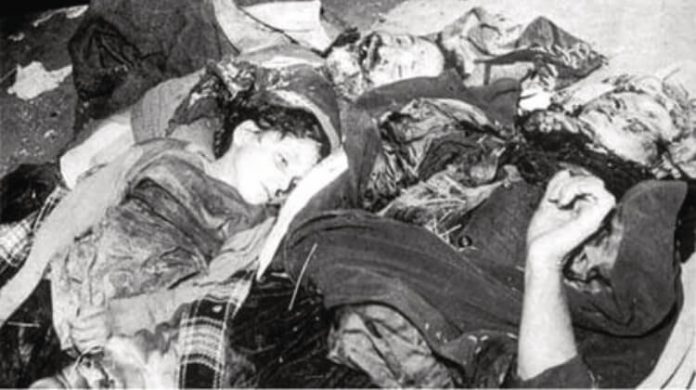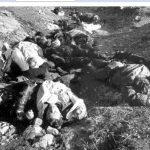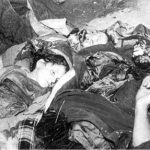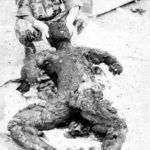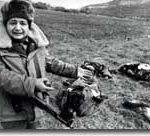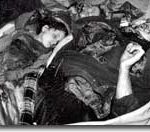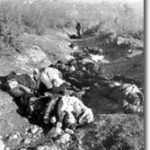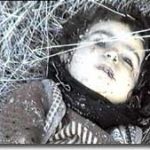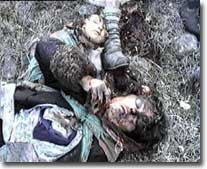 One of the most tragic crimes of human history was committed by Armenians in the Hocalı (Hodjali) district of Azerbaijan at the night of 25th of February in 1992. Upon the directions of the incumbent president of the Republic of Armenia, who accuses Turkey of the so-called Armenian genocide, the Armenian forces undertook armed action against the town of Hodjali in the Karabakh region of Azerbaijan with the intention of massacre. As a result of the invasion of Hodjali, civilian and unarmed people of Azerbaijan were murdered by Armenian armed forces. According to official data, 613 people were killed that night, of those 83 children and 106 women were murdered through ruthless methods of torture. Besides 487 people were heavily wounded, 1275 were taken hostage and the remaining people underwent psychological traumas. 130 children became half and 26 children became full orphan. The Armenian soldiers killed their victims mercilessly hollowing their eyes, flaying their skulls and cutting various parts of their body. Pregnant women and their unborn babies were butchered and many people were buried alive. Even the corpses of the many martyrs were burned.
One of the most tragic crimes of human history was committed by Armenians in the Hocalı (Hodjali) district of Azerbaijan at the night of 25th of February in 1992. Upon the directions of the incumbent president of the Republic of Armenia, who accuses Turkey of the so-called Armenian genocide, the Armenian forces undertook armed action against the town of Hodjali in the Karabakh region of Azerbaijan with the intention of massacre. As a result of the invasion of Hodjali, civilian and unarmed people of Azerbaijan were murdered by Armenian armed forces. According to official data, 613 people were killed that night, of those 83 children and 106 women were murdered through ruthless methods of torture. Besides 487 people were heavily wounded, 1275 were taken hostage and the remaining people underwent psychological traumas. 130 children became half and 26 children became full orphan. The Armenian soldiers killed their victims mercilessly hollowing their eyes, flaying their skulls and cutting various parts of their body. Pregnant women and their unborn babies were butchered and many people were buried alive. Even the corpses of the many martyrs were burned.
The massacre committed by Armenian armed forces 22 years ago in Hodjali is analogous to the massacre of Serebrenica committed by Milosevic in 1995 in Bosnia Herzegovina. As is known the massacre of Serebrenica was recognised by the International Criminal Tribunal For The Former Yugoslavia as GENOCIDE.
Mass killings of Azerbaijan people by Armenian armed forces fully coincides with the genocide concept described as “acts committed with intent to destroy, in whole or in part, a national, ethnical, racial or religious group” in the second article of the Convention on Genocide adopted by the United Nations in 1948. The massacre in Hodjali by Armenian armed forces fits the two of the five conditions of the second article of the UN Convention on Genocide, that describes which acts shall be regarded as genocide. The article mentions that any of those five acts is adequate for an action to be considered as genocide. The mass killings in Hodjali by the Armenian armed forces are compatible with the first and second paragraphs of the second article of the UN Convention on Genocide, which describe genocide as “Killing members of the group” and “Causing serious bodily or mental harm to members of the group”.
With the Hodjali Genocide, a civil community were exterminated/massacred, just because of their ethnic identities, by Armenian armed forces; and hence, the crime of genocide as the most significant crimes of humanity were committed. But, the realities about the Hodjali Genocide have unfortunately not been sufficiently heard in the international arena. Robert Kocharian, the incumbent president of the Republic of Armenia and known clearly as the person responsible for the Hodjali Genocide, and the other responsible could not be punished within the framework of international law despite solid evidence.
Although 22 years have passed since the event, it is seen that the UN, which carries great responsibilities with regard to the incident, and other international organizations do not give the necessary importance to the issue. Same situation is also true about the continuing occupation of the Azerbaijani territory by Republic of Armenia, as is stated in the UN Security Council Resolutions of 822, 853, 874 and 884 and in the Parliamentarian Assembly of the Council of Europe Resolution 1416 dated 25 January 2005.
In this respect, it is a duty of all the concerned persons calling the world community as a whole, along with the interested and authorized institutions for moving to act with respect to the issue, putting an end to the Armenian occupation of the Azerbaijani territory, pronouncing the incident with its real name as the HODJALI GENOCIDE and taking initiatives regarding the punishment of the responsible.
Ali KÜLEBİ, February 2014

